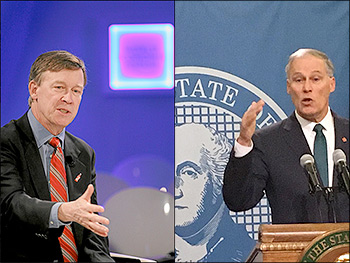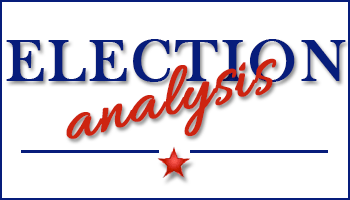By Jim Ellis — Thursday, Sept. 21, 2023
Polling

President Joe Biden / Photo by Gage Skidmore
Responses about the direction of the country and economy and how President Joe Biden is performing on key issues are highly consistent with other findings. The voting public believes by an approximate 2:1 majority that the country and economy are on the wrong track, and President Biden is rated negatively on all key issue areas.
There is a small surprise on the political party approval question. Though the responses are within the polling margin of error, this is the first survey in a long while that produces slightly better numbers for the Republican Party (45:55 percent favorable versus unfavorable) than the Democratic Party (44:56 percent), though both continue to register upside-down numbers.
The Harvard pollsters tested 24 well-known individuals and found a respondent sample that views the overwhelming majority of these public figures in a negative light.
The 24 individuals included all 2024 presidential candidates from both parties with the addition of Vice President Kamala Harris, US Senate Majority Leader Chuck Schumer (D-NY), Minority Leader Mitch McConnell (R-KY), US House Speaker Kevin McCarthy (R-CA), Sens. Bernie Sanders (I-VT), Ted Cruz (R-TX), Josh Hawley (R-MO), Joe Manchin (D-WV), US Rep. Alexandria Ocasio-Cortez (D-NY), Gov. Gavin Newsom (D-CA), former Secretary of State Hillary Clinton, and Elon Musk.
Within this group, only a quarter of the men and women (6 of the 24) registered positively. Surprisingly, Robert F. Kennedy Jr. was the most favorably viewed (+15 percent), followed by former UN Ambassador Nikki Haley and businessman Vivek Ramaswamy (both at +6 percent), Sen. Tim Scott (R-SC) and Elon Musk (both at +5 percent), and Sen. Sanders (+3 percent).
The most negatively perceived were Sen. McConnell (-30 percent), ex-New Jersey Gov. Chris Christie (-20 percent), and former Vice President Mike Pence (-15 percent). President Biden scored a -12 percent, and ex-President Donald Trump fared a bit better at -6 percent.
Perhaps the biggest surprise were Vice President Harris’ ratings. While she scored -4 percent on the favorability index, her rankings in head-to-head pairings with the top Republican presidential candidates generally positive. While the survey showed that she would lose to Trump by six percentage points and tie former Vice President Pence, she leads the others.
Opposite Haley, Harris would lead by a single point. She tops Ramaswamy by two. Her best performance was against Sen. Scott (+7 percent), and Florida Gov. Ron DeSantis (+8 percent). She would also lead Kennedy 45-19 percent for the Democratic nomination if President Biden were to decide not to run.
Conversely, President Biden would trail Trump (-4 percent), Haley (-4 percent), and Sen. Scott (-2 percent). He would lead Pence (+6 percent), DeSantis (+4 percent), and Ramaswamy (+2 percent).
Legal Issues — The Harvard pollsters also queried the sample about the leading presidential candidates’ legal situations.
Regarding whether the sampling universe believes the new Biden impeachment inquiry and ex-President Trump’s prosecutions are legitimate or politically motivated, the respondents break exactly 50/50 on both questions. A majority, however (53-47 percent), support the impeachment inquiry.
There is a different view of the Hunter Biden situation and what the group believes about President Biden’s potential involvement. By a 60-40 percent majority, the respondents say that President Biden had “direct and detailed knowledge about his son’s business dealings.” The same 60/40 break was found when the pollsters asked if “Joe Biden has made false or misleading statements about his son’s business dealings, and what he knew about them.” A 57-43 percent break believes that “Joe Biden was helping his son Hunter get influence-peddling contracts.”
While there is polarization in Congress regarding the nation’s public policy, surprisingly the respondent universe answered the most important issue questions in a rather bipartisan manner.
Republicans (47 percent), Independents (41 percent), and Democrats (31 percent) all identified inflation and prices as the most important issue. Democrats (24 percent) and Independents (16 percent) tabbed climate change as second-most important; for Republicans, it was immigration (19 percent). All three groups reported crime as third-most important (Republicans 15 percent; Democrats 14 percent; Independents 13 percent).
We can count on seeing almost daily polling for the next few months from a multitude of survey research entities. Few, however, will be as extensive and detailed as this Harvard University study.




 By Jim Ellis
By Jim Ellis
